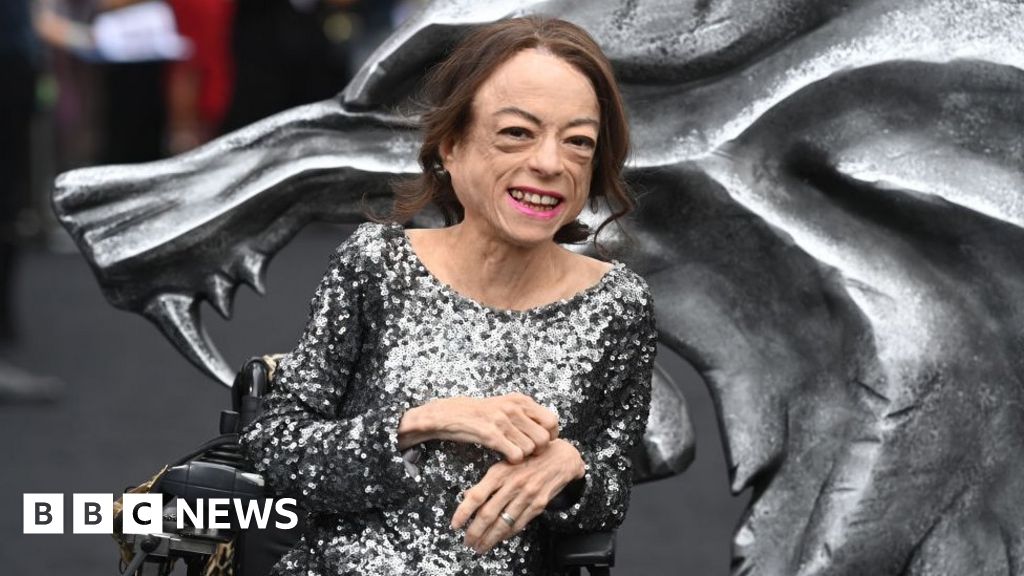- By Natasha Preskey
- BBC News
Image source, Getty Images
The black leather sofa in the corner of Dr Ellen Wiebe’s office looks out of place in a doctor’s surgery.
But this is no ordinary clinic. Canadian clinician Dr Wiebe is showing Liz Carr, a comedian, actress and disability rights campaigner, where people sit when they come to end their lives with the help of a doctor.
“They can snuggle up with their loved ones if they want,” says Dr Wiebe. “It’s a good place for some people.”
Carr became a wheelchair user when she was seven due to arthrogryposis multiplex congenita, a condition which causes limitation of joint movement.
“Apart from the fact I don’t have the desire, I think probably I would be eligible [for assisted dying] under Canadian law,” Carr suggests to Dr Wiebe.
Dr Wiebe doesn’t disagree – though she does tell Carr she would have to convince her she was “suffering unbearably” in order to be given a cocktail of drugs to end her life.
In Canada, people with a disability can have an assisted death, provided they feel they are suffering intolerably and their condition cannot be reversed.
Carr has been a vocal opponent of assisted dying for more than a decade. But in the last six months, the debate has accelerated, with Scotland set to debate an assisted dying bill this autumn, and Labour leader Sir Keir Starmer saying he would back a UK-wide change to the law.
The Silent Witness actress is concerned about how this could affect vulnerable or disabled people. These fears are central to her new documentary Better Off Dead, in which she makes the case against assisted dying in the UK.
Assisted suicide is banned in England, Wales and Northern Ireland, with a maximum prison sentence of 14 years. While there is no specific offence of assisted suicide in Scotland, euthanasia is illegal and can be prosecuted as murder or culpable homicide.
Just last week, broadcaster Esther Rantzen, who is terminally ill with lung cancer, begged MPs to attend a debate on a petition which argues that “terminally ill people who are mentally sound and near the end of their lives should not suffer unbearably against their will”.
Carr is afraid that changing the law for terminally ill people could eventually result in those who are poor, disabled or mentally ill being allowed to have an assisted death in the UK – or even feeling compelled to do so.
The actress says the possibility is “terrifying”.
She points to Canada where the law was changed in 2016 to allow those whose death was “reasonably foreseeable” to have an assisted death, and then changed again in 2021 to include those with a medical condition who were “suffering unbearably”.
Journalist Melanie Reid, who became tetraplegic (paralysed from the neck down) in 2010 after a horse-riding accident, doesn’t see a potential change to the law as something to fear, and tells Carr she has “a human right to decide what happens to my body”.
She believes the law should also allow people who are not terminally ill, but who are suffering in other ways, to end their lives.
But Dr Katherine Sleeman, a specialist in palliative care, says she is concerned for people who may feel they are a burden to their families.
“Patients will say to me: ‘I don’t want to go to a care home really, but I know my family want me to do it and I know it will be easier for them so I think I’m going to say yes’,” Dr Sleeman explains.
“Substitute the words ‘go to a care home’ with ‘have an assisted death’ and I think it’s a completely different picture.”
The specialist believes no assisted dying law can be completely safe, and that some people who do not really want to die will always “slip through the net”.
Lord Falconer, a King’s Counsel who has sponsored four bills that would allow people with less than six months to live to have medical assistance to die, says assisted dying should only be for those with a terminal illness – and that there would need to be legal safeguards to protect vulnerable people.
“Being disabled is most certainly not the same as being terminally ill,” he tells Carr. “The line in the sand for me is terminal illness and it goes no further than that.”
If you have been affected by the issues in this story, help and support is available via the BBC Action Line.

James Parker is a UK-based entertainment aficionado who delves into the glitz and glamour of the entertainment industry. From Hollywood to the West End, he offers readers an insider’s perspective on the world of movies, music, and pop culture.








